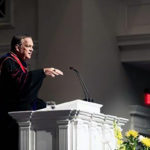Messengers to the Southern Baptist Convention annual meeting continued to steer the denomination in a conservative direction but resisted efforts to push it farther to the right.
At the same time, they sharply rebuked the SBC Executive Committee at several points and raised serious questions about the accountability and transparency of some SBC entities.
The annual meeting drew 15,726 messengers—the largest crowd in 25 years, though far short of the record 45,519 messengers who attended the Dallas convention in 1985.
Ed Litton elected SBC president
Southern Baptists elected a president best known for his involvement in racial reconciliation, narrowly defeating a candidate associated with the Conservative Baptist Network.

In a runoff election for president, Ed Litton, pastor of Redemption Church in Saraland, Ala., edged out Mike Stone, pastor of Emmanuel Baptist Church in Blackshear, Ga., who serves on the Conservative Baptist Network steering council, by 556 votes.
Lee Brand Jr., vice president and dean of Mid-America Baptist Theological Seminary and also a member of the Conservative Baptist Network’s steering council—was elected as first vice president. Ramon Medina, lead pastor of the Spanish ministry at Champion Forest Baptist Church in Houston, was elected second vice president, defeating another member of the network’s steering council, Javier Chavez of Gainesville, Ga.
In a four-way race for president, Stone and Litton emerged as the front-runners. On the first ballot, Stone—a former chair of the SBC Executive Committee—received 5,216 votes, and Litton—who endorsed the “Justice, Repentance and the SBC” statement on race—received 4,630 votes.
Eliminated after the initial ballot was Al Mohler, president of Southern Baptist Theological Seminary, who drew 3,764 votes. Mohler had been the presumptive favorite when he first announced his candidacy prior to the 2020 SBC meeting, which was canceled due to the COVID-19 pandemic. Also eliminated was Randy Adams, executive director of the Northwest Baptist Convention, who received 673 votes.
Litton was nominated by Fred Luter, pastor of Franklin Avenue Baptist Church in New Orleans—the only African American elected as SBC president.
Sign up for our weekly edition and get all our headlines in your inbox on Thursdays
Stone had been instrumental in a controversial SBC Executive Committee investigation of the Ethics & Religious Liberty Commission, and he most recently had been accused of stonewalling efforts to deal with sexual abuse in SBC-affiliated churches.
SBC Executive Committee suffers defeats
SBC messengers not only narrowly rejected Stone as president, but also overwhelmingly rejected a business and financial plan proposed by the SBC Executive Committee. Among other recommendations, the plan would have given the Executive Committee authority to escrow Cooperative Program funds from any convention entity that did not comply with items on a prescribed checklist.
Vance Pitman, a pastor from Las Vegas, said the proposed plan would have been “an unprecedented expansion of the Executive Committee’s powers and would put itself between the local churches and the entities we are trying to support with the Cooperative Program.”
Danny Akin, president of Southeastern Baptist Theological Seminary, also spoke against the measure, saying all six Southern Baptist seminary presidents opposed it because it would jeopardize the schools’ standing with accrediting agencies.
SBC messengers also rejected a recommendation to revise the ministry assignments of Lifeway Christian Resources, transferring college student ministry to the North American Mission Board.
Messengers approved Vision 2025, a strategic plan proposed by SBC Executive Committee President Ronnie Floyd, but only after amending it to include an additional objective: “to eliminate all incidents of sex abuse and racial discrimination among our churches.”
Grant Gaines, pastor of Belle Aire Baptist Church in Murfreesboro, Tenn., moved that an independent task force be created to investigate the SBC Executive Committee’s handling of sexual abuse allegations rather than allow the Executive Committee to guide an investigation of itself. Messengers overwhelmingly approved the motion.
Resolutions approved on race, abortion and Equality Act
At multiple points, messengers and speakers addressed controversy regarding critical race theory, an academic theory that addresses systemic racism and that has become a hot-button issue both in the SBC and secular politics in the past year.
Messengers approved—but not without debate—a broadly worded resolution that did not specifically name critical race theory but stated SBC messengers “reject any theory or worldview that finds the ultimate identity of human beings in ethnicity or in any other group dynamic.”
The resolution denounced “any theory or worldview that denies that racism, oppression or discrimination is rooted, ultimately, in anything other than sin.” It also reaffirmed the 1995 resolution in which SBC messengers apologized to African Americans for “condoning and/or perpetuating individual and systemic racism.”
A resolution presented by the convention’s resolutions committee called any effort to repeal the Hyde Amendment—which bars the use of federal funds to pay for abortions, except to save the mother’s life or in cases of rape or incest—as being “morally abhorrent, a violation of biblical ethics, contrary to natural law, and a moral stain on our nation.”
The resolution also urged Southern Baptists to work to “end the moral scourge of abortion as we also seek to love, care for, and minister to women who are victimized by the unjust abortion industry.”
However, that language was not potent enough for Bill Ascol, a messenger from Oklahoma and a prominent figure in the Calvinist-oriented Founders Ministries. He made a motion that the committee be overruled and messengers be allowed to vote on a resolution calling for the abolition of abortion in the United States. His motion received the necessary two-thirds approval.
When messengers debated Ascol’s resolution, a motion to postpone indefinitely the resolution failed. However, messengers approved an amendment adding the word “alone” to the resolution, saying the SBC cannot embrace “an incremental approach alone” when it comes to seeking abortion’s abolition. The resolution was adopted as amended.
Messengers also approved a resolution denouncing the Equality Act, calling it “one of the greatest threats to religious liberty in our nation’s history.”
An amendment to the SBC’s constitution naming racism and the mishandling of sexual abuse as grounds for disfellowshipping a church gained approval for the second time, as required by governing documents.
EDITOR’S NOTE: The 10th paragraph from the end was edited online to correct a person who was misidentified. The maker of the motion was Grant Gaines, not Steve Gaines.














We seek to connect God’s story and God’s people around the world. To learn more about God’s story, click here.
Send comments and feedback to Eric Black, our editor. For comments to be published, please specify “letter to the editor.” Maximum length for publication is 300 words.